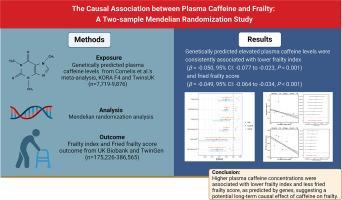The causal association between plasma caffeine and frailty: A two-sample mendelian randomization study
IF 3.5
3区 医学
Q2 GERIATRICS & GERONTOLOGY
引用次数: 0
Abstract
Background
Frailty is one of the most common and challenging consequences of aging, which negatively affects older adults, their families, and society. Caffeine has been shown to be associated with a reduced risk of frailty by observational studies, yet its causal relationship with frailty remains to be tested using more robust methods.
Aims
This study aimed to explore the causal association between plasma caffeine and frailty using a two-sample Mendelian Randomization (MR) analysis.
Methods
Single nucleotide polymorphisms related to plasma caffeine concentrations were selected as instrumental variables. Data on the Frailty Index (FI) were sourced from the UK Biobank and TwinGen meta-analysis (n = 175,226), while data on the Fried Frailty Score (FFS) were obtained from the UK Biobank (n = 386,565). The causal association between plasma caffeine levels and frailty was tested using five MR methods, with the inverse-variance weighted method as the primary approach.
Results
Our results consistently showed significantly negative associations between genetically predicted plasma caffeine with FI (β = -0.050, 95 % CI:0.077 to -0.023, P < 0.001) and FFS (β = -0.049, 95 % CI:0.064 to -0.034, P < 0.001). These results remained robust in further sensitivity analyses using a leave-one-out approach.
Conclusion
Our findings confirm a causal relationship between plasma caffeine and frailty and suggest that increasing plasma caffeine levels may help prevent and reduce the risk of frailty.

血浆咖啡因与虚弱之间的因果关系:一项双样本孟德尔随机化研究
虚弱是老龄化最常见和最具挑战性的后果之一,它对老年人、他们的家庭和社会产生负面影响。观察性研究表明,咖啡因与降低身体虚弱的风险有关,但它与身体虚弱的因果关系仍有待用更有力的方法来检验。目的本研究旨在通过双样本孟德尔随机化(MR)分析探讨血浆咖啡因与虚弱之间的因果关系。方法选择与血浆咖啡因浓度相关的单核苷酸多态性作为工具变量。虚弱指数(FI)数据来自UK Biobank和TwinGen荟萃分析(n = 175,226),而Fried虚弱评分(FFS)数据来自UK Biobank (n = 386,565)。血浆咖啡因水平与虚弱之间的因果关系使用五种MR方法进行测试,以反方差加权法为主要方法。结果我们的研究结果一致显示,基因预测血浆咖啡因与FI呈显著负相关(β = -0.050, 95% CI:0.077 ~ -0.023, P <;0.001)和FFS (β = -0.049, 95% CI:0.064 ~ -0.034, P <;0.001)。这些结果在使用留一方法的进一步敏感性分析中仍然是稳健的。结论:我们的研究结果证实了血浆咖啡因与虚弱之间的因果关系,并表明增加血浆咖啡因水平可能有助于预防和降低虚弱的风险。
本文章由计算机程序翻译,如有差异,请以英文原文为准。
求助全文
约1分钟内获得全文
求助全文
来源期刊
CiteScore
7.30
自引率
5.00%
发文量
198
审稿时长
16 days
期刊介绍:
Archives of Gerontology and Geriatrics provides a medium for the publication of papers from the fields of experimental gerontology and clinical and social geriatrics. The principal aim of the journal is to facilitate the exchange of information between specialists in these three fields of gerontological research. Experimental papers dealing with the basic mechanisms of aging at molecular, cellular, tissue or organ levels will be published.
Clinical papers will be accepted if they provide sufficiently new information or are of fundamental importance for the knowledge of human aging. Purely descriptive clinical papers will be accepted only if the results permit further interpretation. Papers dealing with anti-aging pharmacological preparations in humans are welcome. Papers on the social aspects of geriatrics will be accepted if they are of general interest regarding the epidemiology of aging and the efficiency and working methods of the social organizations for the health care of the elderly.

 求助内容:
求助内容: 应助结果提醒方式:
应助结果提醒方式:


